|
|
|
Sort Order |
|
|
|
Items / Page
|
|
|
|
|
|
|
| Srl | Item |
| 1 |
ID:
165202
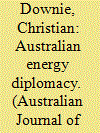

|
|
|
|
|
| Summary/Abstract |
While Australia is considered an energy superpower, Australian foreign policy has often overlooked energy diplomacy. Given the transformations taking place in global energy markets, the time is ripe to begin a policy discussion in Australia on energy diplomacy. I argue that Australian diplomatic efforts should broaden beyond a historical focus on promoting fossil fuels and securing export markets, to driving global energy governance reforms through the G20. This will not only help to ensure that the international energy architecture is capable of achieving governance objectives around energy security, energy access and climate change, but significantly, it will also help Australia to achieve broader foreign policy goals, such as ensuring emerging economies become responsible stakeholders within the international system.
|
|
|
|
|
|
|
|
|
|
|
|
|
|
|
|
| 2 |
ID:
183716
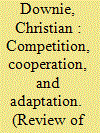

|
|
|
|
|
| Summary/Abstract |
In policy domains characterised by complexity, international organizations (IOs) with overlapping mandates and governance functions regularly interact in ways that have important implications for global governance. Yet the dynamics of IO interactions remain understudied. This article breaks new ground by building on the theoretical insights of organizational ecology to examine IO competition, cooperation, and adaptation in the domain of energy. Drawing on original empirical data, I consider three related hypotheses: (1) competition between IOs in the same population is likely to centre on material resources; (2) IOs are more likely to cooperate when they have a shared governance goal; and (3) individual IOs can adapt by changing their goals and boundaries. In considering these hypotheses, this article highlights the limits of the organizational ecology approach and the need to broaden it to account for the possibility that IOs do cooperate, and that individual IOs, such as the International Energy Agency, have the capacity to adapt to changes in their environment.
|
|
|
|
|
|
|
|
|
|
|
|
|
|
|
|
| 3 |
ID:
140271
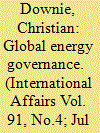

|
|
|
|
|
| Summary/Abstract |
It is widely accepted that the rising power of the BRIC countries—Brazil, Russia, India and China—has the potential to re-shape the international system. However, little attention has been given to the BRICs’ role in a growing area of strategic importance: global energy governance. While global governance scholars now argue that the international energy architecture requires substantive reform to keep pace with the rapid transformations in global energy markets, largely driven by the BRICs, it is not clear what role these countries will play in future governance arrangements. Drawing on recent scholarship in global governance and international negotiations, interviews with G20 energy officials, and the observations of the author, a past delegate to G20 negotiations, this article examines whether the BRICs as a coalition have the capacity and willingness to drive substantive global energy governance reform. In doing so, it highlights the problems with the BRICs as a coalition on energy and considers the prospects for energy reform in light of China's increasing engagement with energy governance ahead of it hosting the G20 Summit in 2016.
|
|
|
|
|
|
|
|
|
|
|
|
|
|
|
|
| 4 |
ID:
140420
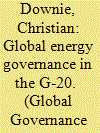

|
|
|
|
|
| Summary/Abstract |
There is an emerging consensus among global governance scholars that there is a global energy governance gap. The rapid transformation of global energy markets with a new cast of producers and consumers, which now accounts for two-thirds of global greenhouse gas emissions, has left the existing institutional architecture behind. While there has been some discussion in the emerging literature on the potential role of the Group of 20, there is almost no analysis of what conditions need to be met for the G-20 to act in a significant fashion. This article takes up this task. Drawing on recent scholarship in global governance, environmental politics, and international negotiations, as well as the observations of the author who is a past delegate to G-20 negotiations, it considers the role of the G-20 in global energy governance and identifies the principal conditions that will need to be met if the G-20 is to drive more than piecemeal change.
|
|
|
|
|
|
|
|
|
|
|
|
|
|
|
|
| 5 |
ID:
185863
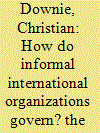

|
|
|
|
|
| Summary/Abstract |
One dimension of the growth in informal global governance has been the rapid rise in the number of informal international organizations (IOs). While some of these organizations, such as the Group of Twenty (G20), are now at the centre of global debates across multiple policy domains we know very little about how they govern. We do not have answers to critical questions, including to what extent do informal IOs rely on indirect forms of governance? On what basis do they select IOs as intermediaries? And why do IOs choose to participate as intermediaries? Drawing on an original database of G20 orchestration between 2008 and 2019, combined with interviews with IO officials and G20 negotiators, this article provides answers to these questions. The data highlight the frequency of G20 orchestration, the importance of capabilities and control in intermediary selection, and IO efforts to solicit G20 orchestration. The findings advance debates on informal IOs to consider how they govern, how intermediaries like the OECD can shape G20 agendas, and why IOs participate in these indirect governance arrangements.
|
|
|
|
|
|
|
|
|
|
|
|
|
|
|
|
| 6 |
ID:
154069
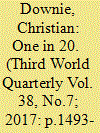

|
|
|
|
|
| Summary/Abstract |
There is a growing consensus that the international system needs to be reformed to reflect the changing distribution of power with the rise of the Brazil, Russia, India and China (BRICs). The Group of Twenty (G20) has been at the centre of these discussions. Within the G20, emphasis has been on great powers or rising powers and their capacity to drive reform. Less attention has been given to the preferences and strategies of middle powers in the G20 and their capacity to shape global governance reform. Drawing on interviews with G20 officials, this paper considers the role of Australia as president of the G20 in 2014. Australia’s presidency presents a unique opportunity to examine the behaviour of a middle power as it balances the competing global governance claims of the USA and the BRICs.
|
|
|
|
|
|
|
|
|
|
|
|
|
|
|
|
| 7 |
ID:
155441
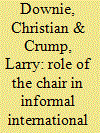

|
|
|
|
|
| Summary/Abstract |
Scholars of international relations have devoted significant effort to understanding international organisations. However, two areas have been understudied: the role of the chair in international multilateral negotiations and the role of informal international organisations. Yet informal international organisations are increasingly important in international affairs as world leaders turn to smaller and more flexible forums to address global challenges. This article addresses these two blind spots in the literature by considering the role of Australia as chair in one of the most important yet most understudied informal international organisations: the Group of Twenty (G20). Drawing on primary interview data and the participant observations of the first author, who was a member of the G20 chair in 2013–14 during Australia’s presidency, the authors examine two theoretical puzzles: (1) why states delegate control of the negotiation process to a chair and (2) how the chair can, and does, influence the negotiation process. It is argued that member states delegate control to the chair to overcome specific institutional failures and, in doing so, provide the chair with the power to influence the negotiation process. The authors also argue that the G20 case indicates that existing theory overlooks key factors which restrict the capacity of the chair to influence the negotiation outcome.
|
|
|
|
|
|
|
|
|
|
|
|
|
|
|
|
| 8 |
ID:
175028
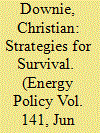

|
|
|
|
|
| Summary/Abstract |
Changes in the international balance of power, transformations in global energy markets, and the proliferation of new energy organizations have left the IEA facing a potential crisis. Traditionally scholars assume that international organizations, such as the IEA, have little autonomy to respond to changes in the international environment. While empirical studies have shown that this does not always match reality, almost no scholarship has focussed on these issues in the domain of energy. In particular, on the strategic role that international organizations can play in their own right and the impact this could have on the existing international energy architecture. This paper seeks to address this gap by focussing on the behaviour of the IEA since 2015 when it commenced a modernisation programme. Drawing on interviews with energy officials, it identifies the key pressures shaping the IEA's environment, the IEA's strategies in response, and the extent to which the IEA's has had autonomy from member states to pursue its strategies. The empirical analysis highlights that policymakers should pay greater attention to the strategic actions of organizations like the IEA and the way they can shape the contours of the energy domain.
|
|
|
|
|
|
|
|
|
|
|
|
|
|
|
|
| 9 |
ID:
114696
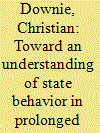

|
|
|
|
|
| Publication |
2012.
|
| Summary/Abstract |
Many of the most significant international treaty negotiations take years, and sometimes decades, to conclude. The international climate negotiations, trade negotiations, and law of the sea negotiations are all examples. Yet, notwithstanding their common occurrence and importance, prolonged international negotiations are not well understood. In these negotiations, state preferences are not fixed, but fluid, as negotiating positions change. This temporal dimension of prolonged negotiations is insufficiently captured by existing theories of international negotiations, which, by virtue of their focus on individual negotiation outcomes at one point in time, tend to be static in their analysis. This article combines an analysis of existing theories of international negotiations with the findings of an empirical study of the climate change negotiations. It reveals a series of internal and external factors distinct to prolonged international negotiations, emphasizes the importance of the temporal dimension, and explains how and why the negotiating positions and the type of agreements states are prepared to sign change over time. Building on these variables, state behavior in prolonged international negotiations can be usefully conceived of as (at different points in time) either an immature or mature game, in which strategic opportunities arise at different phases of the game for networked actors to constructively influence state behavior. Eight strategies are suggested that traditionally weak actors can employ to steer prolonged international negotiations toward their preferred outcome.
|
|
|
|
|
|
|
|
|
|
|
|
|
|
|
|
| 10 |
ID:
137649
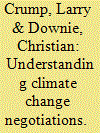

|
|
|
|
|
| Summary/Abstract |
Climate change is the largest and most complicated interdependent issue the world has confronted. Yet there is little negotiation and conflict management knowledge within the climate change context. To address this gap, this theoretical article reviews the sparse extant literature and provides a brief overview of the science of climate change public policy. This review establishes a foundation for examining negotiation and conflict management research questions that emanate from current and future climate change negotiations. Such questions are considered for climate change mitigation negotiations and climate change adaptation negotiations. This article demonstrates how the negotiation and conflict management field can make important contributions to the study of interdependency in a context of climate change.
|
|
|
|
|
|
|
|
|
|
|
|
|
|
|
|
|
|
|
|
|